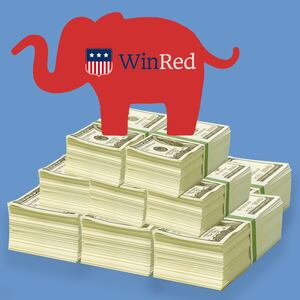A network of shady political groups at the center of a new class action lawsuit for bilking donors out of tens of millions of dollars appears to be attempting a legal work-around in order to continue pulling in the money and evading government scrutiny.
The 17 groups in the network bear the tell-tale signs of “scam PACs”—entities which present themselves to donors as nonprofit charities but register as political groups with the government. The loophole allows the groups to operate in a gray zone outside the reach of the different federal agencies that regulate nonprofits and political groups.
Rep. Katie Porter (D-CA), who has taken steps to hold these groups liable, offered a brief definition of what she calls a “disgusting” scheme.
“Scam PACs are political action committees designed to look like they benefit a legitimate political campaign or cause, when in actuality all the money the PAC collects is going into the pocket of a scammer,” Porter said in a statement to The Daily Beast.
Over the last 18 months, this one network has taken in $40 million from donors in the name of supporting police, firefighters, veterans, paramedics—even people with autism. The money, however, goes almost entirely to telemarketing and consulting outfits. The groups in this particular network pay a number of those companies, but share six of them, and pay them often on the same day. Those payments alone have totaled more than $10 million this year, and other murky companies received millions more from these groups on top of that.
While these PACs operate in what now appears to be a legal limbo, their operators have come under increasing scrutiny in the press. This summer, the network took new, coordinated steps in what experts say is an apparent effort to mislead the government in addition to their donors.
Campaign finance law specialist Brett Kappel of Harmon Curran said these PACS appear to be trying to apply “a veneer of legitimacy” to their operations, indicating a “distinct possibility” that they have come under federal scrutiny.
Starting July 1, all 17 groups—one of which attracted a CNN exposé last year—started reporting payments to the same six telemarketing and consulting companies, frequently on the same day. The new trick, though, is that they now report those payments in a different way, which may help them avoid detection or possible legal action.
One way to identify a scam PAC is by comparing how much money they spend on “operating expenses,” which go to overhead, fundraising, and administrative costs, with how much they spend on “independent expenditures,” which go to support candidates. These groups all report vast discrepancies between those two types of payments, spending nearly all their money on “operating expenses” to sketchy companies, and hardly any on politics.
But July marked a tactical shift. The PACs in this network suddenly started reporting these payments as “independent expenditures,” nominally in support of specific candidates. The total since July 1: $4.6 million. Further, those same businesses had also received millions in “operating” payments in the first half of the year.
The network took another step, too: They all filed federal statements, adding “PAC” to their name.
Also, many of the candidates they claim to support don’t appear to need it. This is an off-year for most US elections. And a number of the candidates aren’t in tight districts.
Kappel said the moves appear to be evidence of coordination, possibly intended to mislead government regulators and law enforcement.
“Without seeing the actual language of these communications, however, it is impossible to tell whether they are actually engaging in express advocacy or merely fundraising under the guise of making independent expenditures,” he said. “Regardless, it appears that the vast majority of the money being spent by these PACs is still going to the people who control them—either directly or to other companies under their control.”
Paul S. Ryan, general counsel for campaign finance watchdog Common Cause, shared Kappel’s analysis.
“For 20 years I’ve been looking at the issue through the other end of the telescope, at ‘dark money’ nonprofits trying to hide that they’re influencing politics,” Ryan said. “This is the opposite—these PACs appear to be trying to pass themselves off as nonprofits and trying to hide that by spending on the political end. It raises the same concern, though, because in both cases they mislead the government about the use of contributions. And that’s where these scam PACs may be running afoul of the law.”
He pointed out that the sudden change in reporting suggests the groups are either mischaracterizing the nature of their spending now, or had been mischaracterizing it for years previously. “It’s illegal to mislead the government,” he said. “And donors should never be lied to.”
Ryan also noted that “it also sounds like we very well could be talking about a federal wire fraud statute violation,” citing the fact that every one of the more than two dozen donors contacted by The Daily Beast over the course of the last year said they had been deceived.
However, many of the companies these PACs pay are registered in such a way that the true owner cannot be traced. The Daily Beast also reached out to people associated with the PACs’ stated addresses, but only one replied.
That woman runs Ridge Innovative, which she confirmed was a wholesale telemarketing service. The company website advertises that among an array of services. She declined to comment on the record.
The Daily Beast also spoke with a woman who answered a call to the phone number for Support Our Firefighters And Paramedics PAC. She said she worked for “the payment processing department,” but would not divulge the name of the company it processed payments for.
The unnamed company, she said, contracts with more than 40 groups, confirming they worked with a number of PACs. One of them was Support America’s Police, which had deceived two donors contacted by The Daily Beast. Both groups are registered to prolific PAC-man Oliver Cappleman, who also runs the Autism Hear Us Now PAC—also in the same network of 17 groups.
When the woman learned she had been contacted by a journalist, she immediately hung up.
The Daily Beast connected the address of yet another business, Cloud Data Services, to Richard Zeitlin, a known shady Las Vegas telemarketing mogul who has been investigated for alleged scam operations. He did not respond to multiple requests for comment. Residents at other given addresses either could not be reached for comment, or did not reply.
The Center for Public Integrity reported in 2020 that groups working with Zeitlin’s companies comprise about half the tens of millions of dollars raised since the charity scam PAC scheme popped up a few years ago.
But the law so far has not caught up. Last year, Porter introduced a bipartisan bill with Rep. Dan Crenshaw (R-TX) which would redefine campaign finance law to hold these “con artists” liable. Sen. Angus King, an independent from Maine, is said to be working on a similar bill.
That leaves the task to the Federal Trade Commission and the Department of Justice, who have not yet cracked down in a way to deter the activity.
The misled donors, however, can also act.
The Daily Beast spoke with 10 PAC donors for this story, though some declined to be quoted. Most of them were retired, and all of them confirmed they had been misled.
One donor, a startup exec who gave $1,000 to a PAC called “Honoring America’s Law Enforcement,” said he did not know it was a political group. He relayed that the federal PAC told him they specifically supported a local police department.
“If they postured as that and stole my money, that’s terrible,” this donor said, noting he would never give to any political groups “regardless of my political leanings.” After a phone interview, the donor, who added that he was under the belief that the donation was tax-deductible as a charity gift, called his credit card company and flagged the payment as fraudulent.
One retired donor, presented with his $500 contribution this year to “Support America’s Police,” said he had also been deceived into giving to a charity. “If that’s true, I’m gonna hunt these fuckers down,” the 69-year-old said. “I’m not in any shape to do that, but I will hunt them down.”
A separate retired donor—who gave $500 to the “US Veterans Assistance Foundation”—had a similar reaction. “I’d like to tell ’em go to hell, to their face,” he told The Daily Beast upon being informed that his donation had not gone to support veterans, but to fundraising for a group which pocketed almost all of its donor money. This donor said he’d like to tell this group to “eff off,” warning that, if they didn’t, he’d come to their office “cut you up, motherfucker.”
Another retired donor, who over the last two years has given $2,100 to the same group, said he was familiar with the name. “When you appeal to people’s feelings for warriors, it’s an easy scam,” he said. He added that his father had fought in the Korean War and veterans “hold a place in my heart.”
This donor also said he gave frequently to major charities, including Doctors Without Borders, the Sierra Club, and the U.S. Deputy Sheriffs Association. The veterans group, he recalled, had “sounded legit, and I have a good sense for what’s bullshit and what’s not,” adding that “they ought to fuckin’ be in jail for this.”
Yet another retired donor didn’t recall making his donation when presented with the $250 receipt for “Support Our Firefighters And Paramedics.”
Several donors contacted by The Daily Beast said they would consider legal recourse. If they do, they would be joining a movement. On Sept. 27, a class action lawsuit was filed in U.S. District Court for the Middle District of Pennsylvania, accusing Zeitlin and a number of affiliated companies and PACs with violating the Telephone Consumer Protection Act via the PAC scheme.
All but two of the 17 PACs in this new network are named in the lawsuit. One of those unnamed groups was Support America’s Police.
The overwhelming majority of these donors, however, are unknown to the public, because they donate in such small amounts that they do not need to be disclosed. But they add up. The Daily Beast previously reported that over the last four years, PACs posing as charities have collected $85 million in donor money—$18 million more than the two top-raising congressional campaign committees in the same period. And only a small fraction went to political spending.
Two donors contacted by The Daily Beast claimed that they had received additional deceptive fundraising calls from the groups after July, when the new reports were being filed. One donor remarked, “Neil Young says ‘rust never sleeps,’ and these people don’t either.”











